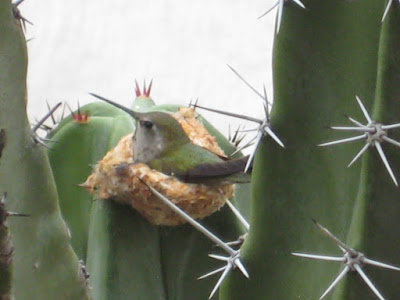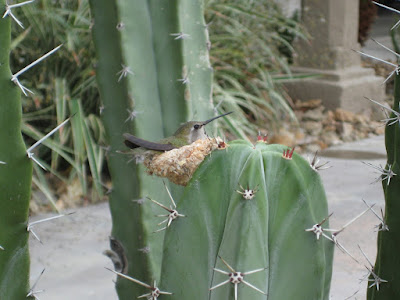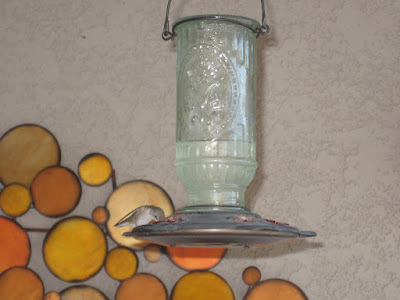Over
the years, Sharon and I have discovered we have a bit of a menagerie here in
the desert. This assortment of curious critters ranges from the ever-elusive
road runner to egrets, amorous bunnies, high-flying hawks and crows, bold
coyotes, an occasional bobcat and lots of hummingbirds.
Wikipedia
does a great job of describing our fascinating aerial interlopers:
‘Hummingbirds are birds native to the Americas and comprise the biological
family Trochilidae. With about
360 species, they occur from Alaska to Tierra del Fuego, but the vast majority
of the species are found in the tropics. They are small birds, with most
species measuring 7.5–13 cm (3–5 in) in length. The smallest extant
hummingbird species is the 5 cm (2.0 in) bee hummingbird, which
weighs less than 2.0 g (0.07 oz). The largest hummingbird species is
the 23 cm (9.1 in) giant hummingbird, weighing 18–24 grams
(0.63–0.85 oz). They are specialized for feeding on flower nectar, but all
species consume flying insects or spiders.
The common ancestor of extant
hummingbirds is estimated to have lived 22 million years ago in South America.
They are known as hummingbirds because of the humming sound created by their
beating wings, which flap at high frequencies audible to humans. They hover in
midair at rapid wing-flapping rates, which vary from around 12 beats per second
in the largest species to around 80 per second in small hummingbirds. Of those
species that have been measured during flying in wind tunnels, their top speeds
exceed 15 m/s (54 km/h; 34 mph). During courtship, some male
species dive from 30 metres (100 ft) of height above a female at speeds
around 23 m/s (83 km/h; 51 mph)’.
In
years past, our hummingbirds usually showed up around February or March when
our flowers began to bloom. We would put out a couple of feeders but they never
seemed to attract the small birds any earlier.
Eventually
as we got used to the birds and they to us, Sharon and I began to pay more
attention to those tiny elusive creatures. Then on day, we stumbled upon one of
their nests in our front yard. For some strange reason a mother hummingbird
decided that a cactus by our door was the perfect place to build a nest and
start a family.
When
we discovered the nest, it became a game hide and seek between us and mother.
Either Sharon or her friend Linda would slowly, carefully slide up to the
cactus and try to photograph mom and her babies. It became a game of cat and
mouse or more appropriately, Sharon, her friend Linda and mother hummingbird.
Both Sharon and Linda were dive-bombed several times when they got too close to
the nest. But their efforts were worth it.
Then
last summer we began to grow our extended family of hummingbirds in our
backyard. In our absence, Linda spent a lot of time around our house, using our
pool, working, reading and relaxing. She put up several hummingbird feeders and
watched in amazement as a whole family of the tiny buzzing birds began to
descend on our property. In short order, we had a family of more than a half
dozen hummingbirds safely ensconced around our backyard.
The
year before, Charlotte had named one of the birds Sugar and that name stuck. So,
it became a game of finding and identifying Sugar as the birds buzzed above our
heads or sat on the outdoor fan and looked down on all of us.
Linda
decided to name one of the most beautiful birds of the group: Pequeño.
This hummingbird has a beautiful vest of deep reflective purple that also quickly
identified her as the most aggressive feeder closest to our back slider.
When
the kids came here for Thanksgiving, Nana had finger food rings for each
grandchild to wear in hopes of feeding the tiny birds. Maya was the most
patient and she was able to capture on film and video, herself feeding Pequeño.
We
were also able to capture a mother hummingbird feeding her newborn. It was a
marvelous picture of nature and the bond between mother and her youngest offspring.
Even in the bird world, some things never change.















1 comment:
Great photos.
Post a Comment